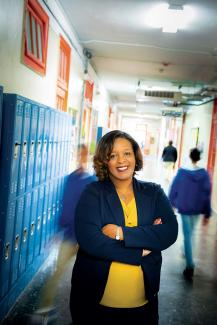HIGH SCHOOL PRINCIPAL
This summer Cola joined Sci High — officially The New Orleans Charter Science and Mathematics High School — after having worked in administrative positions at Xavier University of Louisiana and Delgado Community College. That the neuroscientist would end up in a high-school office, with a lone Florence flask on a windowsill to remind her of her previous life, is not by accident. She took this job in order to contribute to the development of the next generation of scientists.
“I guess all along I had been preparing myself to do this, seeing what students’ weaknesses and strengths were when they came into the postsecondary classrooms. I always said, ‘What could high schools be doing better to make sure these students are prepared?’ Now I get to prepare those students to go to postsecondary,” she said. “I have the unique perspective of knowing what’s expected on that side, knowing what students should be doing.”
The 500-student, open-enrollment school welcomes any high schoolers who want to work hard and focus on STEM (science, technology, engineering, math), Cola said. The students can choose from a variety of electives like engineering, robotics, digital media, video, computer science and biomedical science, a crime-scene-investigation type course that delves into forensics. Sci High has a maker space and advanced placement courses. It uses curricula from Project Lead the Way, a national nonprofit that enhances STEM skills for grades preK–12. There is CTE (career technical education) instruction for those students who want it.
“We take kids of varying levels of academic achievement and try to give them a nurturing and rigorous environment,” she said. “We expect a lot of them, and they step up to the plate.”































































